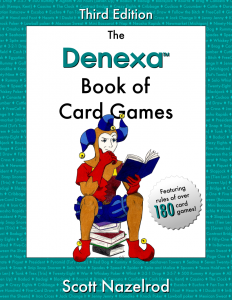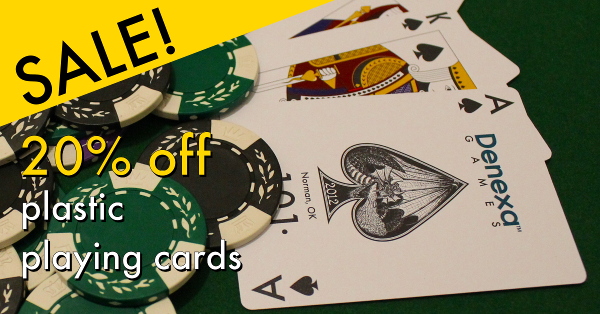Yaniv (a.k.a. Jhyap, Dhumbal)
Yaniv, as it is known in Israel, or Jhyap or Dhumbal, as it is known in Nepal, is a rummy-type card game for two to five players. Yaniv shares a common goal with Gin Rummy: each player is trying to reduce their unmatched cards’ point total below a certain threshold, whereupon they can end the game. In Yaniv, however, melds are discarded instead of held in the hand, meaning certain cards can be drawn from the discard pile and used over and over.
The game most likely originated in Nepal as Jhyap. Somehow, it spread from there to Israel, where it has enjoyed a period of popularity, especially among younger players, for the past several years.
Object of Yaniv
The object of Yaniv is to discard melds and be the first to call “Yaniv”, hopefully ensuring that the total of your unmatched cards is lower than that of your opponent.
Setup
Yaniv is played with a 54-card deck formed by augmenting a deck of Denexa 100% Plastic Playing Cards with two jokers. If you are playing with four or more players, you may wish to use a 108-card double deck to avoid frequent shuffling. You’ll also need something to keep score with—pencil and paper will do the job wonderfully.
Shuffle and deal five cards to each player. Place the stub in the center of the table to form the stock. Turn over the top card of the stock; this is the first card in the discard pile.
Game play
In Yaniv, each of the face cards is worth ten points. Aces are worth one point, and are always low. All other cards are worth their face value. Jokers are worth zero.
Play of the hand
The player to the left of the dealer goes first. Unlike most rummy games, in Yaniv, the first thing a player does is discard. A player may discard a single card, like they do in typical rummy games. However, they may also discard a set of two or more cards of the same rank. They can also discard a run of three or more cards of the same suit in sequence (e.g. 8-9-10-J♦). A player may only make one discard per turn. They can’t discard, say, a set then a run, or two runs, or two different sets.
In sequences, cards rank in their usual order, with aces always low. Q-K-A is not a valid combination! Also, jokers may be used as wilds to substitute for any card in a sequence (but not in a set).
It is important to keep the cards discarded in the proper order. Runs must always be kept in numerical order. Sets may be played in any order the player chooses.
After discarding, the player draws. The player may draw one card from the stock, or they may choose to take either the first or the last card that the previous player discarded. Thus, if the previous player discarded 8-9-10-J♦, the player may only draw the 8 or the jack, not the 9 or 10. This is where some strategy in discarding can be used—by carefully choosing the order they discard the cards in, a player can deny access to certain cards to the player after them!
Going out
As the game goes on, players gradually reduce the count of their deadwood (the cards left in their hand). When a player’s deadwood reaches five or fewer points, they may call “Yaniv!” to go out. This must happen at the beginning of their turn, before they discard.
All players then turn their cards face up. If the player has the lowest point total, they score zero for the hand, and all other players score the total value of the cards left in their hand. If another player has a lower point total than the player that called “Yaniv”, every player scores the value of the cards left in their hand. The player that called “Yaniv” also scores a 30-point penalty.
At the end of a hand, if a player has a score of exactly 200 points, their score resets to 100 points. Likewise, if a player ends a hand with exactly 100 points, their score is reduced to 50 points.
Ending the game
The deal passes to the left and another hand is dealt. This continues for as many hands as necessary. When a player’s score exceeds 200 points, they are out of the game and are not dealt into later hands. The last player remaining in the game is the winner.


